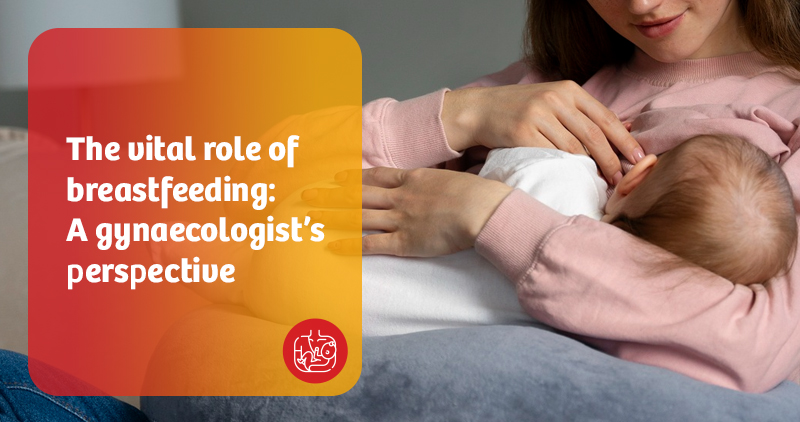Breastfeeding is not just a natural act—it's a cornerstone of infant and maternal health. As a gynaecologist, I have had the privilege of guiding countless mothers through the journey of pregnancy, childbirth, and postnatal care.
One of the most crucial conversations during this journey revolves around breastfeeding. Despite the increasing awareness, myths and doubts still surround this subject, making it vital to revisit the necessity and profound impact of breastfeeding on both the baby and the mother.
Breastfeeding: More than just nutrition
Breast milk is often called “liquid gold”—and for good reason. It is uniquely designed by nature to cater to a newborn’s exact nutritional needs, and it evolves with time to match the baby's growth and development stages. However, beyond the nutritional benefits, breastfeeding is a profoundly physiological, emotional, and immunological experience.
From the baby’s lens: Why it matters
- Perfect first nutrition
Breast milk contains the right mix of proteins, fats, carbohydrates, vitamins, and minerals that a newborn needs in the first six months of life. It is easy to digest and is tailored for each stage of development—colostrum (the first milk) is rich in antibodies and white blood cells to jump-start the baby’s immune system.
- Immunity booster
One of the most profound benefits of breastfeeding is the protection against infections. Breast milk is rich in immunoglobulins, lactoferrin, and lysozymes, which safeguard babies from gastrointestinal infections, respiratory diseases, and even meningitis. Studies show that exclusively breastfed babies have lower rates of hospitalisation and death in the neonatal period.
- Reduced risk of chronic illness
Breastfed babies have a lower lifetime risk of obesity, diabetes (type 1 and 2), asthma, and certain cancers. The gut microbiota shaped by breast milk plays a key role in developing the immune system and metabolic health.
- Better brain development
Human milk contains long-chain polyunsaturated fatty acids such as DHA (Docosahexaenoic Acid), which are essential for brain and retinal development. Breastfed babies often show better cognitive development and higher IQ scores compared to formula-fed babies.
- Emotional bonding
Breastfeeding fosters skin-to-skin contact, which soothes the baby, regulates temperature and heartbeat, and enhances the bond between mother and child. This early emotional nurturing lays the foundation for emotional resilience later in life.
From the mother’s lens: How breastfeeding benefits her
As a gynaecologist, I emphasise that breastfeeding is equally beneficial for the mother’s physical, emotional, and long-term health.
- Postpartum recovery
Breastfeeding triggers the release of oxytocin, a hormone that helps the uterus contract back to its pre-pregnancy size. This reduces postpartum bleeding and lowers the risk of postpartum haemorrhage, a leading cause of maternal mortality.
- Natural contraception
Exclusive breastfeeding suppresses ovulation through a mechanism called the lactational amenorrhea method (LAM). While not foolproof, it can act as a natural, short-term birth control for the first six months if specific criteria are met.
- Reduced risk of certain cancers
Multiple studies have shown that women who breastfeed have a lower risk of developing breast and ovarian cancers. The longer breastfeeding is continued, the greater its protective effect, which is thought to be linked to hormonal balance and reduced exposure to estrogen.
- Lower risk of chronic diseases
Breastfeeding reduces the mother's long-term risk of type 2 diabetes, cardiovascular disease, and metabolic syndrome. This is especially significant in women with gestational diabetes or obesity during pregnancy.
- Emotional well-being
Breastfeeding can foster emotional fulfilment, improved maternal-infant bonding, and even a lower risk of postpartum depression. The hormonal balance achieved during breastfeeding, especially oxytocin, is known to promote calmness and reduce stress.
The first hour: Why early initiation matters
The first hour after birth is often referred to as the “GOLDEN HOUR”. Initiating breastfeeding within this window has immense benefits
- It enhances maternal-infant bonding
- Stimulates milk production early
- Reduces neonatal mortality
- Promotes early colonisation of beneficial bacteria in the baby's gut
Unfortunately, due to unnecessary delays in medical procedures, social customs, or a lack of support, this opportunity is often missed. Hospitals and healthcare professionals must actively support immediate skin-to-skin contact and early breastfeeding.
Challenges mothers face—and how we can help
Despite the known benefits, many mothers struggle to breastfeed due to various reasons, and antenatal counselling on breastfeeding is necessary. It plays a crucial role in the breastfeeding journey. It prepares expectant mothers by providing practical knowledge on early initiation, proper latch techniques, and the importance of exclusive breastfeeding for the first six months. Counselling during pregnancy helps address common concerns, dispel myths, and boost a mother's confidence, making her better equipped to handle challenges after delivery. This early support boosts breastfeeding success, promotes healthier newborns, and deepens the emotional bond between mother and baby. Let’s understand some common challenges.
- Latching issues
Improper latching can lead to nipple pain, soreness, and ineffective feeding. Lactation counselling plays a crucial role here.
- Perceived low milk supply
A common myth is "I’m not producing enough milk." In most cases, it’s not a true low supply but a lack of frequent feeding or poor latch. Education and reassurance can significantly improve outcomes.
- Returning to work
The pressure to return to work leads many women to stop breastfeeding prematurely. Creating breastfeeding-friendly workplaces, providing lactation breaks, and supporting pumping facilities are essential.
- Social stigma
In many societies, public breastfeeding is still frowned upon. Normalising breastfeeding through awareness campaigns and community support is vital to encourage mothers.
- Medical complications
Some women may have medical conditions like inverted nipples, PCOS, or hypothyroidism that affect milk production. These can often be managed with early intervention and medical support.
Exclusive breastfeeding: The gold standard
The World Health Organisation (WHO) and UNICEF recommend
- Exclusive breastfeeding for the first six months of life
- Continued breastfeeding alongside complementary foods up to 2 years or beyond
Exclusive breastfeeding means no other food or drink—not even water—is given to the infant. This provides optimal nutrition and immune protection during the most vulnerable period of life.
Breastfeeding and long-term health
Breastfeeding is not only a personal health decision; it’s a public health priority.
- Reduces healthcare costs
Breastfeeding significantly reduces the risk of common infant illnesses, including diarrhea, pneumonia, and ear infections. It translates to lower healthcare expenses and fewer hospital visits.
- Improves national health indicators
Nations that support and promote breastfeeding have lower infant mortality rates, better maternal health, and improved child development outcomes.
- Environmentally sustainable
Unlike formula feeding, breastfeeding requires no packaging, processing, or shipping. It is the most eco-friendly form of infant feeding.
Role of healthcare providers
As gynaecologists, obstetricians, and nurses, we have a duty to
- Educate mothers during antenatal visits
- Encourage early initiation and exclusive breastfeeding
- Offer postpartum support through lactation consultants
- Advocate for hospital policies like the baby-friendly hospital initiative (BFHI)
- Partner with paediatricians to support continued breastfeeding
Best hospital in Ahmedabad for women and child care.
In a nutshell
Breastfeeding is a lifelong gift.
Breastfeeding is a natural and powerful act of love and nourishment. It reduces infant mortality and improves maternal health.
As a gynaecologist, I encourage every mother-to-be to understand that breastfeeding is not merely a choice between formula and breast milk. It’s a decision that can profoundly impact both mother and child. With the proper support, information, and encouragement, she can give her child the healthiest possible start.
At KD Blossom, the women's and children's department at KD Hospital, we are dedicated to supporting every mother on this journey. From antenatal breastfeeding counselling, early initiation support, lactation guidance, to postpartum care—our comprehensive, compassionate team ensures mothers are informed, empowered, and supported at every step.
Let’s celebrate, protect, and normalise breastfeeding—because every drop truly counts.

